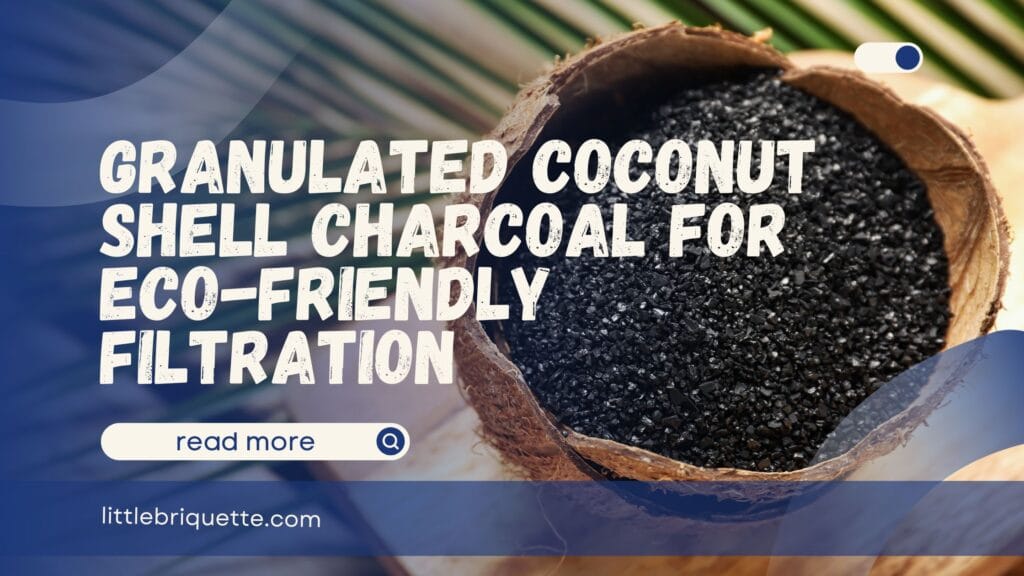In a world that is increasingly aware of the importance of sustainability, granulated coconut shell charcoal has emerged as an environmentally friendly filtration solution. Filtration processes, which are crucial for purifying air, water, and various other substances, have long faced significant challenges due to the reliance on chemicals and conventional methods that harm the environment.
This article will explore how granulated coconut shell charcoal, with its ability to naturally filter pollutants, provides a greener and more effective alternative, helping us protect the planet in a cleaner and more sustainable way.
What is Granulated Coconut Shell Charcoal?
Granulated coconut shell charcoal is a material produced through the process of pyrolysis, or high-temperature heating, of coconut shells, which is then ground into fine granule-shaped particles. The manufacturing process begins by heating the coconut shells in an oxygen-free environment (since oxidation would reduce the charcoal’s quality) at very high temperatures, ranging from 600 to 900 degrees Celsius.
Once the pyrolysis process is completed, the resulting charcoal is ground into small grains or granules of a specific size to increase the surface area and enhance filtration efficiency. This granulation makes the charcoal easy to use in various filtration applications, such as in water and air filters, as well as other products that require the removal of chemicals, odors, and pollutants.
One of the reasons granulated coconut shell charcoal is so effective as a filtration material is due to its unique characteristics. This charcoal has a very high adsorption capacity, thanks to its microporous structure, which allows small particles and molecules of harmful substances to be captured efficiently.
Additionally, its high porosity gives it a large surface area, enabling it to absorb more contaminants in a shorter time. Besides its exceptional absorption abilities, granulated coconut shell charcoal is also stable and durable, not easily crumbling or losing its effectiveness after use. All these qualities make it the material of choice for filtering various substances, with minimal environmental impact.
Read Also: Production Process & Advantages of Upgraded Coconut Charcoal
Advantages in Filtration
Granulated coconut shell charcoal offers a range of advantages that make it an extremely effective and environmentally friendly filtration material. Unlike conventional filtration methods that often rely on chemicals or synthetic products, coconut shell charcoal provides a natural and efficient solution for various filtration needs.
Here are some of the key advantages of granulated coconut shell charcoal in filtration processes, from air and water purification to its ability to absorb harmful gases and its role in environmental sustainability.
Air Filtration

Granulated coconut shell charcoal is highly effective in air filtration, particularly in eliminating unpleasant odors and harmful gases. The charcoal’s microporous structure allows it to absorb various pollutants, including volatile organic compounds (VOCs), ammonia, and other odors commonly found in residential or industrial environments.
This natural activated carbon can be installed in air filtration systems for homes, vehicles, or even industrial spaces to improve air quality. One of its key advantages is its ability to neutralize pollutants without adding chemical burdens to the environment, making it a safer and more natural option compared to other filter materials.
In addition to removing odors, coconut shell charcoal also helps reduce airborne pollutants that are harmful to human health. Hazardous gases such as formaldehyde, benzene, and toluene, which are often present in indoor air, can be effectively absorbed by this charcoal. With its ability to filter out these pollutants, granulated coconut shell charcoal not only improves air quality but also contributes to reducing the health risks associated with poor air quality, such as respiratory issues and allergies.
Granulated Coconut Shell Charcoal for Water Filtration

The use of granulated coconut shell charcoal in water filtration has proven effective in reducing heavy metals, chlorine, and other harmful chemicals that can contaminate water sources. Through the adsorption process, coconut shell charcoal absorbs various contaminants that may be present in water, such as heavy metals, pesticides, and even chlorine commonly used in water purification processes.
As a result, water filtered with coconut charcoal becomes cleaner and safer for consumption, while also reducing the potential negative impact of chemicals on human health. Additionally, coconut charcoal can be used to improve the taste and quality of water. Chlorine, often added during water treatment to kill microorganisms, can leave an unpleasant taste and odor.
Carbon Absorption Capabilities

Another standout advantage of this type of charcoal is its ability to absorb carbon dioxide (CO2) and other harmful gases, which helps reduce air pollution. The absorption process works through the small pores in the charcoal, allowing these gases to be trapped and absorbed very efficiently. Its use in air filters can reduce carbon emissions in enclosed spaces or areas with high air pollution, contributing to an overall improvement in air quality.
This ability is especially important in the context of reducing the global carbon footprint, as carbon dioxide is one of the greenhouse gases responsible for climate change. By absorbing CO2, granulated coconut shell charcoal not only improves air quality but also serves as a small tool in the global effort to combat global warming. Therefore, its use in air filtration systems in industries, vehicles, and even households is an essential step toward a cleaner and greener environment.
Natural and Environmentally Friendly Material

Granulated coconut shell charcoal is an environmentally friendly choice compared to other synthetic filtration materials, such as artificial activated carbon. Its production process uses abundant natural materials, namely coconut shells, which are a byproduct of the coconut industry commonly found in tropical countries. Unlike synthetic activated carbon, which requires a lot of energy and chemicals in its production, coconut shell charcoal utilizes the pyrolysis process, which is more environmentally friendly and poses less risk to ecosystems.
Moreover, granulated coconut shell charcoal can be recycled after use in filtration, supporting the principles of sustainability. The use of this natural material reduces dependency on more harmful resources and lowers the carbon footprint of the manufacturing process. Therefore, by choosing granulated coconut shell charcoal as a filtration material, we not only obtain an effective filtration solution but also support environmental conservation and sustainability efforts.
Read Also: Raw Coconut Shell Charcoal – A Profitable Business Potential
Centers for High-Quality Coconut Charcoal Production
To reap the full benefits of coconut charcoal, it is important to pay attention to its quality. The quality of coconut charcoal used in filtration must be high, as low-quality charcoal can lead to long-term negative impacts on air and water purification processes.
You can obtain high-quality coconut charcoal briquettes by purchasing from Little Briquette. Little Briquette is trusted, with production certification and a reputation for offering high-quality coconut charcoal briquettes. You can contact the admin at this number to get top-quality coconut charcoal briquettes.

